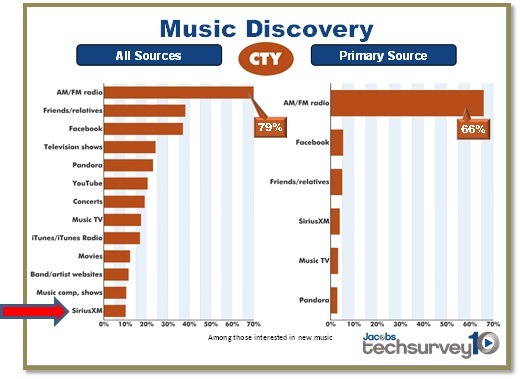Last week, a big music story involving radio focused on SiriusXM programmer John Marks and how his “Highway” channel has become a music influencer.
That Wall Street Journal article was highly quoted in the radio trades as Marks garnered support from a number of Country artists that he first played on satellite radio. From there, they went on to become mainstream hits.
As author Hannah Karp noted, “…new music services from Sirius, Pandora, Spotify, and others are starting to disrupt Nashville’s long-closed ecosystem, even as terrestrial broadcasters pour their resources into amassing country listeners, who are generally wealthier, better educated and more likely to use social media than fans of other genres…”
Competition can be a good thing, especially for the music community. It provides them with new and additional outlets to expose artists and songs. But the reality is that record labels, artist management teams, and the artists themselves would be wise to look at the entire picture of music discovery – especially when it comes to Country.
Because it’s a place where broadcast radio rules.
After reading about Marks – who obviously has a great set of ears and is obviously as a strong supporter of the genre – I dug into our Techsurvey10 Country breakout to learn more about music discovery for this format.
When given the choice, Country listeners in our survey – nearly 3,000 strong – tell us that whether given multiple choices or a single primary option for new music and new artist discovery, it’s not a contest. FM radio is king – and these percentages are higher for Country than for any other format measured in TS10.
On the left, Country fans could list all the sources they use to expose themselves to new music. On the right, we asked them to tell us their primary source.
And no matter how you slice it, satellite radio is at or near the bottom. If you’re going to tell me that our survey is “radio-heavy,” that’s true, of course. But as you can see on the “All Sources” side of the chart, Facebook, TV shows, Pandora, and YouTube all make healthy appearances. And throughout our survey – subtitled “The Digital Tipping Point” – many of these other music sources play prominent roles in the changing nature of how consumers entertain and inform themselves. Radio listeners aren’t just listening to radio, not by a long shot.
But when it comes to satellite radio, the reality is that it functions a lot like that weak-signaled Alternative station did back in the ‘90s. It was the station the record guys loved because they were very liberal with their “adds.” And the big stations in town typically used it as a bellwether when a new song or band was introduced. If it started showing signs of life, they’d begin to give it some spins.
The power, however, continues to be centered in broadcast radio. And while it is undergoing unprecedented challenges during this time of disruption, it still has the tremendous ability to curate, introduce, and promote artists and the music they make.
Not to take anything away from Marks, his channel, and his efforts. Broadcasting needs trendsetters, risk-takers, and innovators. That said, an “add” on a strong Country station like WKLB/Boston or WYCD/Detroit is infinitely more powerful.
Country stars – just like the music makers in all formats – need broadcast radio to make hits.
- What To Do If Your Radio Station Goes Through A Midlife Crisis - April 25, 2025
- A 2020 Lesson?It Could All Be Gone In A Flash - April 24, 2025
- How AI Can Give Radio Personalities More…PERSONALITY - April 23, 2025





“…country listeners, who are generally wealthier, better educated and more likely to use social media than fans of other genres…”
I don’t know when I’ve seen a statement that was less true. While increased popularity has mitigated some of this, country listeners are still the slowest to adopt new trends and are certainly less tech savvy, wealthy and educated than listeners to many other formats.
There is nothing like seeing an article covering a subject you know something about to remind you how little homework the media often does when they produce a piece.
Bottom line is there probably isn’t a major format that is LESS dependent on social media and other music sources than Country – or one that should be more focused on terrestrial radio for new music exposure. The basic premise of the article was dead wrong IMO.
I had some of those same thoughts about how the Country audience was depicted in the article. Yes, they are heavy Facebook users but beyond that…
Bob Bellin, you know I love you, but your opinion is off base and contradicts what we’ve seen in our research at Coleman Insights. Our findings are encapsulated in the quote from my colleague Chris Ackerman in this recent article from the American Marketing Association: https://www.ama.org/publications/MarketingNews/Pages/crossing-borders.aspx
Warren, thanks for this. While the Country audience continues to be among the most loyal, it is notable how the socio-economic status has improved over time.
I apparently overstated the case given how much country has grown, but I’d be shocked if the country fan base “was wealthier, better educated and more likely to use social media than fans of other genres”. While “other genres” could mean any two other formats, the implication I got from the article was that country listeners had evolved to the point of being at the top of the psychographic curve. Warren, I’ll stand corrected if that’s the case, but I’d be shocked if country’s audience comp had changed that much.
Getting to an index of 100 on education and tech savvy would represent huge, almost historic shift for country. Has the audience actually changed more than that?
Good analogy with the ’90s weak signal alt fm/sat. Makes sense.
Thanks, John.